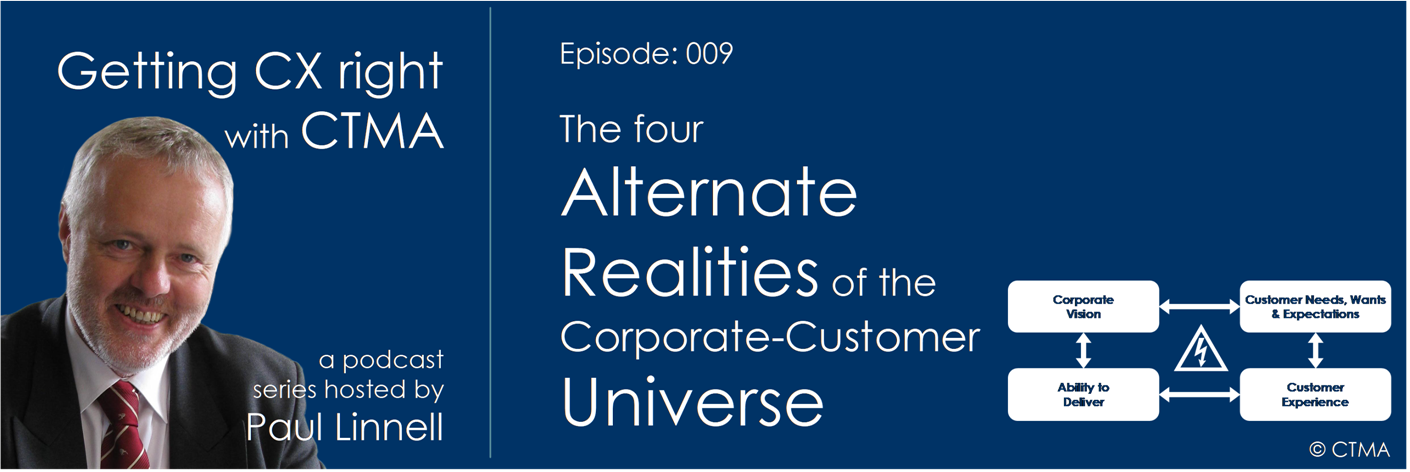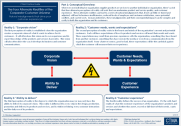The Four Alternate Realities of the Corporate-Customer Universe
By Paul Linnell
Iíve been getting a lot of questions recently about how hard it is
for customer experience professionals to get buy-in for investment in
customer experience improvement programmes. This, at a time when
business, public services and customers are all experiencing so much
change and so many challenges. Itís almost as though the huge
efforts and sacrifices that so many made during the global health
crisis, to keep responding to their customers, has been forgotten.
During the global health crisis, customer service functions needed to
duck and weave to keep their organisations afloat. In record time, they
had to change their operating procedures, adopt new practices and new
technologies, and many moving to remote working.
There wasnít time to go
through a lengthy business justification and an ROI calculation. It was
a case of survival for those who could adapt the fastest and best to do whatever was needed to serve their customers.
But now, as the world slowly returns to normal, many organisations
have moved on to what they see as a new crisis of change. Itís one
driven by a cascade of issues like increased prices, limited finance and
resources, and problems of shipping and supply.
But thereís a risk, that
the customer is now being missed out of the equation and that
organisations may have forgotten that their success is, and always has
been, driven by their ability to satisfy the needs of their customers.
For customer experience professionals to succeed in the current
environment, they are having to rebuild the rigour of disciplines and
frameworks to describe and justify where customer experience investment
is needed to support this, and future crises of change.
What you’ll learn in this episode:
So, Iíd like to turn to one of the diagnostic
frameworks we use in our customer experience transformation programmes
to help demonstrate the role that positive customer experiences have on
an organisationís success, and the cost of getting things wrong.
In this episode we look at the four alternate realities of the
corporate-customer universe.
By the end of this episode you should have a better insight into the
dynamics at play that undermine value, add unnecessary costs, and the
steps you need to take to get the information you need, to make the best
decisions, to set the right priorities, and take the right actions, for
your organisation to succeed in these challenging times.
Also mentioned in this episode
Next Episode: #010: Getting CX right, when everything seems to be going wrong!
 In
the next episode Iíll be looking at a selection of some of the guiding
principles we use in our customer experience transformation programmes
to help our clients to be in a much better position to respond to their
customers when problems do occur. These guiding principles can be used
to underpin your business-as-usual strategy, and also relied upon to
support how your organisation responds to unplanned events or a crisis.
They can help you to reduce costs, reduce reputational risk, and recover
faster from unplanned events or a crisis, whilst improving productivity,
improving customer satisfaction and loyalty, and improving staff
capability and wellbeing.
In
the next episode Iíll be looking at a selection of some of the guiding
principles we use in our customer experience transformation programmes
to help our clients to be in a much better position to respond to their
customers when problems do occur. These guiding principles can be used
to underpin your business-as-usual strategy, and also relied upon to
support how your organisation responds to unplanned events or a crisis.
They can help you to reduce costs, reduce reputational risk, and recover
faster from unplanned events or a crisis, whilst improving productivity,
improving customer satisfaction and loyalty, and improving staff
capability and wellbeing.
About Paul Linnell
 Paul Linnell is a customer experience and service quality
improvement champion, working internationally with senior managers
and their teams to help them achieve business success, reduce risk
and build customer loyalty and advocacy by taking actions to improve
customer experiences. Paul specialises in the design and deployment
of customer experience measurement, service quality improvement,
complaints handling and preventive analysis programmes. Industries
he has worked with include, Automotive, Consumer electronics,
Consumer goods, Electricity & Gas retail, Financial services,
Information technology, Local Government and Public Sector, Media /
Publishing, Passenger travel (Rail, Air and Sea), Pharmaceuticals
and Telecommunication. Paul has worked with clients and presented on
these subject at conferences and corporate events in the UK, Europe,
North America, the Middle East, Australia and New Zealand.
Originally from the UK and now based in New Zealand, he continues to
serve clients globally.
Paul Linnell is a customer experience and service quality
improvement champion, working internationally with senior managers
and their teams to help them achieve business success, reduce risk
and build customer loyalty and advocacy by taking actions to improve
customer experiences. Paul specialises in the design and deployment
of customer experience measurement, service quality improvement,
complaints handling and preventive analysis programmes. Industries
he has worked with include, Automotive, Consumer electronics,
Consumer goods, Electricity & Gas retail, Financial services,
Information technology, Local Government and Public Sector, Media /
Publishing, Passenger travel (Rail, Air and Sea), Pharmaceuticals
and Telecommunication. Paul has worked with clients and presented on
these subject at conferences and corporate events in the UK, Europe,
North America, the Middle East, Australia and New Zealand.
Originally from the UK and now based in New Zealand, he continues to
serve clients globally.




 Paul Linnell is a customer experience and service quality
improvement champion, working internationally with senior managers
and their teams to help them achieve business success, reduce risk
and build customer loyalty and advocacy by taking actions to improve
customer experiences. Paul specialises in the design and deployment
of customer experience measurement, service quality improvement,
complaints handling and preventive analysis programmes. Industries
he has worked with include, Automotive, Consumer electronics,
Consumer goods, Electricity & Gas retail, Financial services,
Information technology, Local Government and Public Sector, Media /
Publishing, Passenger travel (Rail, Air and Sea), Pharmaceuticals
and Telecommunication. Paul has worked with clients and presented on
these subject at conferences and corporate events in the UK, Europe,
North America, the Middle East, Australia and New Zealand.
Originally from the UK and now based in New Zealand, he continues to
serve clients globally.
Paul Linnell is a customer experience and service quality
improvement champion, working internationally with senior managers
and their teams to help them achieve business success, reduce risk
and build customer loyalty and advocacy by taking actions to improve
customer experiences. Paul specialises in the design and deployment
of customer experience measurement, service quality improvement,
complaints handling and preventive analysis programmes. Industries
he has worked with include, Automotive, Consumer electronics,
Consumer goods, Electricity & Gas retail, Financial services,
Information technology, Local Government and Public Sector, Media /
Publishing, Passenger travel (Rail, Air and Sea), Pharmaceuticals
and Telecommunication. Paul has worked with clients and presented on
these subject at conferences and corporate events in the UK, Europe,
North America, the Middle East, Australia and New Zealand.
Originally from the UK and now based in New Zealand, he continues to
serve clients globally.